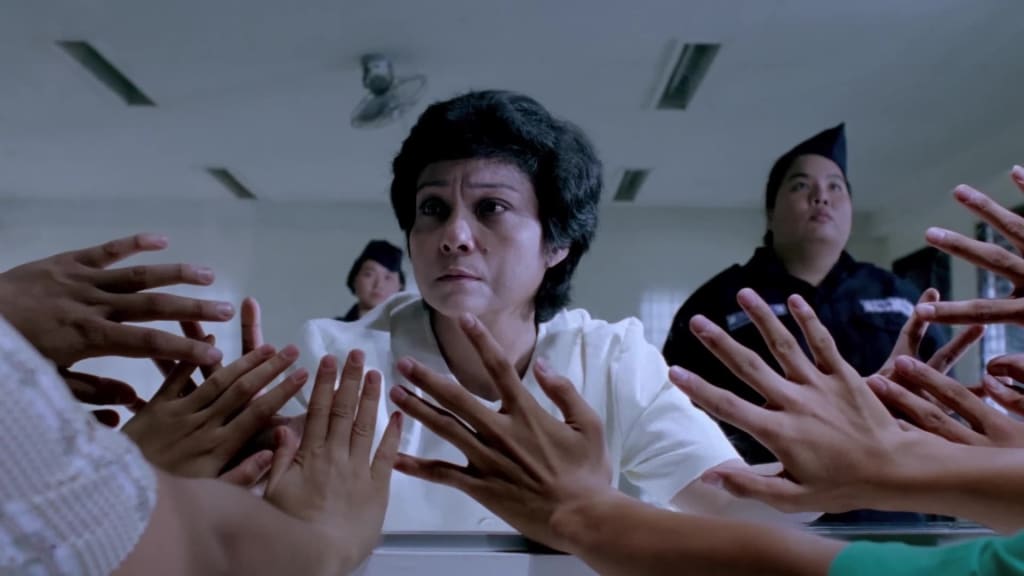‘THE FLOR CONTEMPLACION STORY 1995’ MOVIE REVIEW: A MIRROR TO OFWs’ CRIES AND BATTLES
A Feature-Movie Review that tackled the relevance of a 1995 Filipino film based on the tragic tale of a Filipina Overseas Filipino Worker (OFW) in Singapore

"Either in our country or the other, I am still a slave!" - Flor Contemplacion
Modern heroes, as they say, because of their courage to leave their families and test their luck abroad – which they didn't find in the Philippines. They are brave enough to solely bring their luggage with them, tons of memories, and surely a bereavement in it. Who are we referring to? The Overseas Filipino Workers (OFW), our modern heroes as they are called.
Striving to work abroad isn’t comfortable if that is what most of us thought. It is way more than we could imagine. Some thinks that OFWs are living a comfortable life due to the balikbayan boxes they import to their beloved families, filled with chocolates and foreign products. But it is much more than that because the balikbayan boxes that we received from our OFWs did not entail their struggles, their cries, the grief, and the longing. Hence, their stories were written and channeled through the lens of a film in 1995, it is the real-life tragic tale of Flor Contemplacion that reflects the sorrowful stories of OFWs.
It was 1995 when the filmmaker Joel Lamangan directed 'The Flor Contemplacion Story 1995' – the story of Flor, a domestic helper in Singapore who was executed on March 17, 1995. Her death was brought by a framed accusation of killing her Filipina colleague, Delia Maga, and the Singaporean young boy whom Delia was taking care of. Despite being proven innocent by the 1995 Gangayco Commission, she was still executed, which ignited the Filipinos’ rage against the unjust system.
How did Flor lead to her execution?
Poverty, time passes by but poverty still exists in the Philippines. Social issues such as poverty, inadequate wages, and incompetence of government were showcased in the film. This pushes most Filipinos to leave their family and work abroad with hopes of rendering a better future for their beloved like Contemplacion.
The inferiority of Women, and the prevailing dominance of men and women as subordinates were displayed in the film. As a woman who suffers in a patriarchal society, Flor was forced to leave to find other means of providing for her children because she could no longer simply rely on her husband.
But soon after she left to work, her husband, Efren had an affair with another woman while she was struggling abroad; this film exposed the suffering of women in a patriarchal society where men are dominant and worshipped while women are treated as inferior.
This film also showed how powerful women could be once they make a stance like how Neneng (Efren’s mistress) stood up to help and voice out for Flor. Meanwhile, the movie reflected the toxicity of masculinity and men's fragility when Efren only cried, while his wife’s foot kept drowning in the grave.
The Abrasive Battle
The OFWs took a risk to traverse a thousand miles, going to another country for employment with better wages that would perhaps, save them from their discomfort living in the Philippines due to poverty. But, little did they know that it also has an abrasive compensation — a battle that they aren’t prepared for.
The movie showed the miserable consequences of being a domestic helper. Unfortunately, most OFW Filipinas were abused by their masters, some of them were locked up, raped, and beaten, which could lead them to death like Delia Maga. Do you wonder who was the real culprit to her death? The truth is, it was Delia’s employee who murdered her by being beaten.
The Society’s watchdog
In devastation, injustices and oppression to citizens that occurs like what befell for Flor and Delia, it is tremendously pivotal that Journalism must show up due to its power as a catalyst — and Lamangan’s film exposed its massive contribution to democracy and society.
Primarily because journalism should be finitely anchored to its ethics and principles — nothing but only to bring back the power to people through the TRUTH.
Relevance
Flor Contemplacion’s case occurred 28 years ago, and yet her tragic life still occurs today — different times and faces, but similar devastating fate. She, Delia, and numerous OFWs were killed by the decayed system rooted in the negligence and incompetence of the government.
To wrap it up, Flor represents the OFWs and the Filipinos who were failed and victimized by the corrupt system. This film is relevant and necessary, especially since Filipinos are still governed by their oppressors. Her horrific befallen just reminds us of the chronic and enormous issues in the Philippines.
About the Creator
AnnJellica Marasigan
A Senior Journalism student who has a great passion for story-telling and self-discoveries.
Enjoyed the story? Support the Creator.
Subscribe for free to receive all their stories in your feed. You could also pledge your support or give them a one-off tip, letting them know you appreciate their work.






Comments
There are no comments for this story
Be the first to respond and start the conversation.